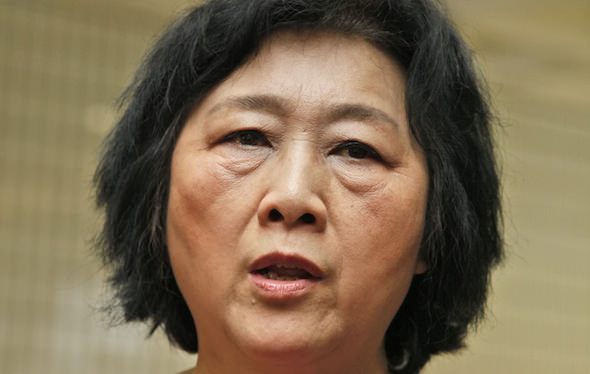Truthdigger of the Week: Gao Yu
The journalist's detention before the 25th anniversary of the slaughter at Tiananmen Square shows the Chinese government's determination to repress those pursuing democracy.The journalist's detention before the 25th anniversary of Tiananmen Square shows the Chinese government's determination to repress those pursuing democracy.
Every week the Truthdig editorial staff selects a Truthdigger of the Week, a group or person worthy of recognition for speaking truth to power, breaking the story or blowing the whistle.
A few days after internationally renowned journalist Gao Yu’s Twitter feed went silent in late April, Chinese state media announced that she had been “criminally detained” for leaking state secrets to a foreign media outlet. A broadcast video alleged to show the 70-year-old, who suffers from multiple medical conditions, making a confession. A female figure with her face blurred says: “I admit that what I’ve done touched on legal issues and threatened national interests. … My actions were very wrong. I have sincerely learnt my lesson, and I admit my guilt.”
Gao’s friend and lawyer, Teng Biao, told the BBC that he suspects the charge against her pertains to a memo alleged to be an internal document of the Chinese Communist Party. The memo, known as Document No. 9, enumerates perceived threats, namely Western ideas of democracy, civil society and freedom of the press, to the party’s ideological hold on the Chinese people. Gao wrote about the document last year. In its report on her detention, state news agency Xinhua claimed that she illegally obtained the memo and passed it to a news agency that disseminated it internationally.
The timing of Gao’s incarceration is uncanny. She is one of many artists, intellectuals and journalists to be detained in the weeks leading up to the 25th anniversary of the slaughter at Tiananmen Square. Journalists inclined to professionally commemorate the event, in which hundreds and possibly thousands of students and other pro-democracy activists were killed by the Chinese military in 1989 at the end of nearly two months of demonstrations and all hopes of political liberalization were brought to an end, say spring always comes with palpable pressure from the government to remain silent. Teng told The New York Times that Gao had been warned not to speak to reporters ahead of the anniversary of the protest’s end.
A number of activists were among the others who were rounded up, including well-known human rights lawyer Pu Zhiqiang, lecturer Hu Shigen, researcher Xu Youyu, writer Liu Di and professor Hao Jian. The had attended a seminar on the Tiananmen protests days before. Pu has represented many Chinese dissidents, including artist Ai Weiwei, who is well known in the West. Amnesty International said Gao’s son, Zhao Meng, had been missing since late April too. Her husband died late last year.
Additionally, the Times’ Chinese desk reported that authorities detained Chen Guang, 43, “a former soldier turned artist whose experiences during those tumultuous days have become a haunting inspiration for his work.” A friend of Chen’s who wished not to be named said of the private performance that preceded Chen’s arrest, “It was empowering. … People want to remember what happened on June 4, but they can’t do it in public spaces. Now apparently you can’t even remember in private.”
Gao is no stranger to state aggression. She was first arrested the day before the protests ended in 1989 and held for 450 days. In 1994 she went to prison, the Committee to Protect Journalists reported, for writing “candidly and authoritatively — though not especially critically — about Chinese economic and political affairs.” The mayor of Beijing labeled her work a blueprint for “turmoil and rebellion.” In 1993 she was again incarcerated on charges alleging she leaked state secrets. She has spent more than seven years in prison altogether.
Contrary to her reputation as a dissident, some of her local colleagues have a more measured view of Gao. Yuen Ying Chan, director and professor of journalism and media studies at the University of Hong Kong, said of Gao, “She’s not a journalist who demonstrates in the streets. She’s the kind that would push for the publication of facts and information.” It is a remarkably conventional description of journalistic standards. The suggestion that they are enough to rate a reporter an enemy of the state speaks volumes about the Chinese government’s commitment to maintaining the ignorance and pliability of its citizens.
In an interview with the Committee to Protect Journalists, Gao’s lawyer appeared to accept the footage that claimed to show Gao’s confession. “I think she must have faced very severe pressure during detention,” Teng said. Chan was appalled that the government would broadcast confessions of people under extreme duress and in confinement. She said the practice began last year.
Strictures like those placed by the Chinese government upon its people always have social control as their goal. Readers should scan Document No. 9. Its language is sufficient to convince anyone that the members of the country’s elite are deadly determined to keep their fellow citizens separated from ideas that may enjoin them to seize, in perpetuity, basic freedoms of thought and mobility. Gao’s commitment to plain facts are a central part of that effort. Numerous awards, including the Golden Pen of Freedom, the Guillermo Cano World Press Freedom Prize, the International Women’s Media Foundation’s Courage In Journalism Award and Gao’s presence on the International Press Institute’s year 2000 list of 50 World Press Freedom Heroes, testify to that fact. We wish Gao Yu a speedy release and honor her proudly as our Truthdigger of the Week.
Your support matters…Independent journalism is under threat and overshadowed by heavily funded mainstream media.
You can help level the playing field. Become a member.
Your tax-deductible contribution keeps us digging beneath the headlines to give you thought-provoking, investigative reporting and analysis that unearths what's really happening- without compromise.
Give today to support our courageous, independent journalists.








You need to be a supporter to comment.
There are currently no responses to this article.
Be the first to respond.